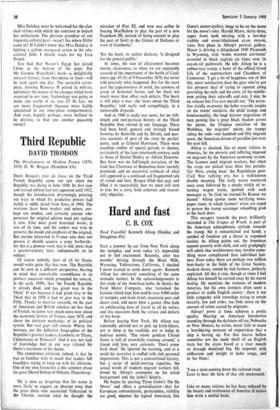Third Republic
DAVID THOMSON
Denis Brogan's tour de force on the Third French Republic came out just when the Republic was dying in June 1940. Its first new and revised edition had not appeared until 1967, though the introduction, disarmingly pointing out ways in which his predictive powers had failed, is oddly dated from Iowa in 1964. The revisions have been modest and minor, per- haps too modest, and certainly anyone who possesses the original edition need not replace it now. Like most good historical works, it was of its time, and the author was wise to preserve the mood and emphasis of the original. But anyone interested in France who does not possess it should acquire a copy forthwith: for this is a pioneer work that is still, more than a quarter-century later, indispensable on its subject.
Of course nobody, least of all Sir Denis, would write quite like that now. The Republic can be seen in a different perspective, bearing in mind that remarkable resemblance to its postwar successor which prompted the remark, in the early 1950s, that 'the Fourth Republic is already dead, and has given way to the Third.' It was because it had given way to the Third that in 1958 it had to give way to the Fifth. Thanks to massive research, on the part of American and British scholars no less than of French, we know very much more now about the economic history of France since 1870, and about the intricate mechanics of its political system. But vast gaps still remain. Where, for instance, are the definitive biographies of the Republic's greatest leaders, Gambetta or Tillers, Clemenceau or Poincare? And it was not lack of knowledge that in any way vitiated Sir Denis's treatment of his theme.
The commonest criticism, indeed, is that he was so familiar with so much that readers felt breathless trying to keep up with his allusions. One of my own favourites is this sentence about the great liberal bishop of Orleans, Dupanloup : 'He is now so forgotten that his name is more likely to suggest an obscene song than the great cleric who reconciled Talleyrand to the Church, resisted what he thought the mistakes of Pius XI, and now was active in forcing MacMahon to play the part of a new Napoleon III, instead of being content to play the part of Soult to the Guizot of Dufaure or even of Gambetta.
Yet the book, its author declares, 'is designed for the general public.'
At times, the vice of allusiveness becomes merely elusiveness, as when we are repeatedly assured of the importance of the battle of Coul- miers (pp. 45-51) of 9 November 1870, but never told precisely what happened. But for the most part the capaciousness of mind, the sureness of grasp of historical forces, and the sheer wit much more than offset such defects. The book is still what it was—the 'news about the Third Republic,' told racily and compellingly, in a memorable dispatch.
And in 1940 it really was news, for no full- length and non-partisan history of the Third Republic then existed in any language. There had been brief, general and strongly biased histories by Bainville and by Zivaes, and mas- sive accounts of part of the story by partici- pants, such as Gabriel Hanotaux. There were excellent studies of special periods or themes, particularly of the later nineteenth century, such as those of Daniel Halevy or Adrien Dansette. But there was no full-length narrative, of the kind that Chastenet or Bonnefous have recently produced, and no masterful synthesis of what still appeared as a confused and fragmented tale of sound and fury. Brogan filled that gap, and filled it so successfully that we must still turn to him for a story both coherent and reason- ably objective.


































 Previous page
Previous page